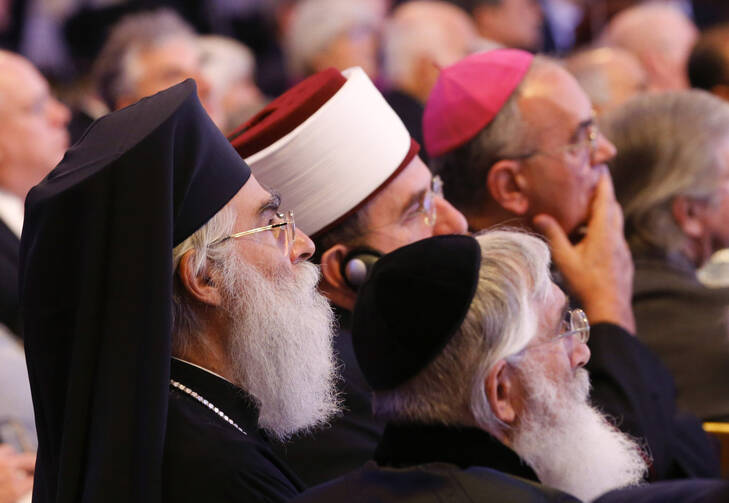The closing day of the four-day conference at Georgetown University celebrating the close of the Second Vatican Council was devoted to the council’s opening to other faiths, especially Judaism and Islam. It was also a day for tough questions and cautionary observations from interfaith interlocutors.
Abdulaziz Sachedina, professor of Islamic Studies at George Mason University and a veteran of the Muslim-Catholic dialogue, declared that “Vatican II deserves to be emulated by other exclusionary faith communities.” Still, he observed that “religious communities have not come to terms with the demand that their own traditions should be regarded as one among many . . .” He added, “I can still hear clear and loud anti-pluralist sentiments coming from almost all monotheistic traditions in the (Middle East) region. . .”
Turning to Muslim-Christian dialogue, he observed that in the civil atmosphere of dialogue has quietly excluded some hard questions as outside the bounds of “dialogical conversations.” Chief among these, for Christians, are “the religious validity of the prophethood of Muhammad and the Qur’an as the revealed message of God.”
"These are real thorny issues which have blocked chances for better inter-communal relations in the poor countries of Africa, South Asia and the Far East,” Professor Sachedina said. On the part of Muslims, he commented, their full engagement is held back by “a sense of superiority and to an extent self-righteousness engendered by the doctrine of ‘the best community’ (khayra ummatin) ever to come forth on this earth.”
Even among modernly educated Muslims, he noted, “there are those who shun the idea of interfaith relations and co-existence on the basis of this self-proclaimed uniqueness and perfection.”
As to Christians, he said, “It is clear to me that for any Christian leader to say there is some validity to a faith other than Christianity . . . would require enormous wisdom and courage.”
Still, he acknowledged Vatican II’s Nostra Aetate, the Decree on Non-Christian Religions is still the standard of mutual respect and appreciation for all world religions. “[T]he statement of Vatican II in the context of Eastern Traditions like Hinduism and Buddhism,” he said, “that ‘Catholic Church rejects nothing that is true and holy in these religions’ says volumes about the new understanding of multi-faith societies around the globe and the right attitude that Christians should adopt in dealing with them with respect and tolerance.”
Turning to Judaism, Georgetown’s Professor Jonathan Ray, in a talk entitled “Lingering Shadows, and the Road Ahead,” assessing the Jewish-Catholic dialogue, argued that as much as Catholics may want to put the history of Christian anti-Semitism behind them, Jews cannot do that. Jewish identity continues to be rooted in a history of persecution, discrimination and victimization. “A legacy of shadows,” he predicted, will continue to haunt Jewish-Christian relations for the foreseeable future.
A major drag on the progress of Jewish-Catholic relations, according to Professor Ray, are the internal anxieties afflicting the Jewish community today over inter-marriage and continuing, world-wide persecution. These are worries that affect all varieties of Jews.
An even weightier hindrance, Ray observed, is the growing internal tension between the growing Orthodox and Ultra-Orthodox communities and more liberal Conservative, Reform and secular Jews. Liberal Jews don’t communicate with the Orthodox, and the Orthodox have very little desire to relate to them.
In a similar talk, Michael Friedman, a graduate student in comparative theology at Georgetown, made the case that formal dialogues between religious bodies have “not yet penetrated Jewish society.” “Rabbinical schools offer very little by way of preparation for interreligious work,” he wrote in a précis, “and the lay Jewish community remains largely unaware and unaffected by dialogue.”
Earlier in the week during the Nostra Aetate Conference at the Catholic University of America in a response to a keynote by Cardinal Timothy Dolan, Rabbi Noam Marans of the American Jewish Committee pointed out that the cardinal used the word God 28 times, while he had invoked it only once, possibly twice, as a potentially significant disparity between Jewish and Catholic interlocutors. While Cardinal offered a pragmatic social-pastoral agenda in his talk, it was presented in a religious/theological context.
The contrast between the cardinal's and the rabbi's invocation of God suggested another asymmetry in Jewish-Catholic dialogue. While the last decade and a half of dialogue has included regular theological exchanges, the burden of the relation, particularly for Jewish participants, may be found in the practical agenda, while Catholic put greater store in the theological and religious elements.
Drew Christiansen, S.J., a former editor of America and a distinguished professor at Georgetown University, is a longtime participant in Jewish and Muslim dialogues.








